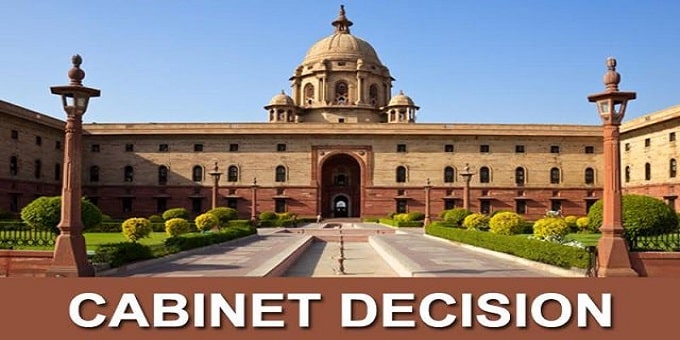The Cabinet Committee on Economic Affairs (CCEA) Chaired by the Prime Minister Shri Narendra Modi has approved the following proposals on February 19, 2020. The approval in detail are as follows: Cabinet okays signing of updated AIFMD pact between SEBI and UK’s FCA
Cabinet okays signing of updated AIFMD pact between SEBI and UK’s FCA
The Union Cabinet has approved the signing of updated Alternative Investment Fund Managers Directive (AIFMD) agreement between Securities & Exchange Board of India (SEBI) and the UK’s (United Kingdom) Financial Conduct Authority(FCA).
Key Points:
i.The move comes after the UK split from the European Union (EU) on 31 January 2020.Britain’s Financial Conduct Authority (FCA) regulates its financial services companies and financial markets.
ii.Major Impact:After exiting the UK from the European Union, the Financial Conduct Authority asked SEBI that the current MoU between the market regulator and the FCA concerning AIFMD is currently governed by EU legislation that does not directly apply to the UK. It was therefore suggested to sign a revised AIFMD MoU .Thus, this proposal is not expected to affect employment in India.
iii.Background: With the intention of establishing adequate supervision cooperation arrangements between the authorities of the European Union (EU) and non-EU countries, a bilateral Memorandum of Understanding (MoU) was signed on 28 July 2014 on the European Union Alternative Investment Fund Managers Directive (AIFMD)with securities regulators from 27 member countries of the European Union / European Economic Area, including the UK’s Financial Conduct Authority (FCA).
Cabinet approves upgrading BISAG as BISAG(N) under MEITY
The union cabinet has approved the upgrading of Gandhinagar (Gujarat ) based Bhaskaracharya Institute of Space Applications and Geoinformatics (BISAG) as Bhaskaracharya National Institute for Space Applications and Geo-informatics (BISAG(N)).It will function under Ministry of Electronics & Information Technology (MEITY), Government of India(GoI).
Key Features:
i.This approval will maintain the efficiency and innovation of services ,facilitate the implementation of an expanded scope of activities & also help efficient research and development, and technology development.
Background
At present, BISAG is a state agency of Department of Science and Technology Government of Gujarat, located at Gandhinagar, Gujarat. It is registered as a Society and Trust with the Charity Commissioner of Ahmedabad. Its Governing body is chaired by the Chief Secretary, Government of Gujarat.
Cabinet clears Phase II of Swachh Bharat Mission (Grameen)
The Union Cabinet has approved the Phase II of the Swachh Bharat Mission (Grameen),that will be implemented from 2020-21 to 2024-25 in a mission mode with a total outlay of Rs. 1,40,881 crores.
Key Points:
i.Program Implementation: Under this program, open defecation free (ODF) campaign will be continued with focus on ODF Plus and Solid and Liquid Waste Management (SLWM)will also be promoted.
ii.SLWM will be monitored based on the following four indicators – Plastic waste management, Bio-decomposed solid waste management (including animal waste management), Grey water management, Sewage sludge management.
iii.Center and states share in implementation: This program will be operated jointly with the Center by the States / UTs(Union Territories). The ratio of fund sharing for all components between the Center and the States will be 90:10 for the North Eastern states, Himalayan states and Jammu and Kashmir Union Territory, 60:40 for other states and 100: 0 for other UTs.
iv.Mission objectives and background: Rural sanitation coverage at the time of the launch of Swachh Bharat Mission (Gramin) on 2 October 2014 in India was recorded at 38.7 percent.
More than 10 crore individual toilets were constructed under this mission, as a result of which the rural areas of all the states declared themselves ODF on 2 October 2019.
v.Under the program, provision for incentive of Rs.12,000/- for construction of Individual Household Toilet (IHHL) to the newly emerging eligible households as per the existing norms will continue.
vi.Financial assistance to the Gram Panchayats (GPs) for construction of Community Managed Sanitary Complex (CMSC) at village level has been increased from Rs.2 lakh to Rs.3 lakh per CMSC.
Cabinet approves to raise interest subvention for Dairy processing & Infrastructure Development Fund (DIDF) from 2% to 2.5%
The Union Cabinet has given its approval to increase the interest subvention on loans given to farmers in the dairy sector from 2% to 2.5 % under the scheme Dairy processing and Infrastructure Development Fund (DIDF)with the revised outlay of Rs 11184 Cr.
i.This will benefit 95 lakh farmers spread over 50,000 villages from increasing interest subsidy & will also help add new dimensions to the ‘White Revolution’ (rapid development in the area related to milk production).
ii.Under DIDF, the central government will give an exemption of 2.5% interest to NABARD (National Bank for Agriculture and Rural Development) from 2019-20. This amendment has come into effect from July 30, 2019.
iii.The funding period of the scheme (2017-18 to 2019-20) has been revised from the year 2018-19 to the year 2022-23 and the repayment period may be extended till the first quarter of FY 2031-32. For this, 37 sub-projects have been submitted including a total estimated cost of Rs 4,458 crore. Of which the loan share will be Rs. 3,207 crore. So far, loans worth Rs 1,110 crore have been disbursed by NABARD to the National Dairy Development Board (NDDB) for implementation.
iv.The scheme envisages to have interest subvention component of Rs 1167 crore to be contributed by DAHD during the period of 2018-19 to 2030-31 with spill over to first quarter of the FY 2031-32. The scheme also has a loan component of Rs. 8004 crore to be contributed by NABARD. Rs. 2001 cr shall be contributed by Eligible End Borrowers and Rs. 12 cr would be jointly contributed by National Dairy Development Board (NDDB)/National Cooperative Development Corporation (NCDC).
Cabinet approves Rs 4,458 crore scheme for dairy sector
The Union Cabinet has approved a Rs 4,458 crore scheme to encourage the dairy sector, which will benefit about 95 lakh farmers.
i.This will add new dimensions to the milk revolution in the country.
ii.The government will also install 28000 Bulk Milk Coolers. This will increase the capacity to keep milk cold by 140 lakh liters.
iii.Altogether 37 sub-projects have been submitted with estimated cost of Rs.4458 crore, of which loan component would be Rs.3207 crore for the scheme. Out of Rs.3207 crore, as on date, Rs.1110 crore has been disbursed in two installments of loan by NABARD to NDDB for implementation of the scheme.
Cabinet approves scheme for “Formation and Promotion of Farmer Producer Organizations (FPOs) ” to form and promote 10,000 new FPOs
Cabinet approved Central Sector Scheme titled “Formation and Promotion of Farmer Produce Organizations (FPOs)” to create 10,000 new FPOs in the next 5 years (2019-20 to 2023-24) across the country.
i.For this period a budgetary provision of Rs 4,496 crore has been made. Under this scheme, a liability of Rs 2,369 crore has been arranged for each FPO during the period from 2024-25 to 2027-28.
ii.Initially, there will be three agencies for the formation and promotion of FPOs, including Small Farmers Agri-business Consortium (SFAC), National Cooperative Development Corporation (NCDC) and National Bank for Agriculture and Rural Development (NABARD).
iii.NABARD will have a Credit Guarantee Fund of up to Rs 1,000 crore with NABARD and DA & FW contributing equally. Similarly, NCDC will have a Credit Guarantee Fund of Rs 500 crore in which NCDC and DAC&FW (Department of Agriculture Cooperation & Farmers Welfare) will have equal contribution.
iv.State governments may also nominate their agency for this in consultation with the DAC&FW under Union Ministry of Agriculture. The DAC&FW will allocate clusters and states to the implementing agencies to form Cluster Based Business Organizations (CBBOs) in the states.
v.The collective power of farmers will increase with the formation of FPO, which will make it easier for them to get quality agricultural inputs, technology and loans and will facilitate their access to the market and this will increase their income
Cabinet clears Assisted Reproductive Technology Regulation Bill 2020
The Union Cabinet, taking a historic decision for the welfare of women in the country, has approved the ‘Assisted Reproductive Technology Regulation Bill 2020’.The approval follows the introduction in Parliament of the Surrogacy Regulation Bill 2020, and the approval of the Medical Termination of Pregnancy Amendment Bill 2020.
Benefits:
i.It will regulate safe and ethical practice of assisted reproductive technology services in the country. This will instill confidence in intending couples about the ethical practices adopted under the ART(‘Assisted Reproductive Technology).
ii.This will curb the commercialization by controlling unethical practices. These legislative measures will further empower women’s reproductive rights.
iii.Through this bill, the National Board, State Boards, National Registry and State Registration Authorities will regulate and monitor clinics and assistive reproductive technology banks associated with assisted reproductive technology.
Assisted reproductive technology:
It is used to solve the problem of infertility. This includes fertility treatments that use both women’s eggs and men’s sperm. In this, eggs are obtained from the body of women and mixed with sperm to make embryos. After this, the embryos is again put into the woman’s body.
In vitro fertilization is the most common and effective type of ART.
Cabinet nod to set up a 12-member Technology Group headed by VijayRaghavan
The Union Cabinet has approved the formation of 12-member “Technology Group” headed by Principal Scientific Adviser to Government of India (GoI),Prof K. VijayRaghavan. The 3 key pillars of the work of this group will include support on policy, procurement and R&D(Research & Development) proposals.
i.This technology group will give better suggestions about latest technologies; mapping of technology and technology products, commercialisation of dual use technologies developed in national laboratories and government R&D organisations; developing an indigenisation road map for selected key technologies; and selection of appropriate R&D programs leading to technology development.
Cabinet okays revamping of PMFBY & Restructured Weather Based Crop Insurance Scheme
The Union Cabinet has allowed to make significant changes to the Pradhan Mantri Fasal Bima Yojana (PMFBY) and Restructured Weather Based Crop Insurance Scheme (RWBCIS) in order to address the challenges.
The Cabinet has also approved a number of changes under the scheme.
i.Accordingly, no state government can enter into an agreement with the insurance company for less than 3 years.
ii.The Central subsidy has been limited to 30% for non-irrigated areas and 25% for irrigated areas.
iii.The government has now decided to make Enrolment of farmers under PMFBY voluntary.
iv.In addition, the government will provide 90% of the premium for crop insurance for North East farmers (Both PMFBY/RWBCIS).
v.Smart technology solutions like Smart Sampling Technique (SST) and optimization of number of CCEs (Crop Cutting Experiments) to be adopted in conducting CCEs (PMFBY).
vi.To estimate crop losses/admissible claims, 2-Step Process to be adopted based on Deviation matrix by using parameters like weather indicators, satellite indicators, etc.
vii.This cabinet decision will be implemented only from the kharif season beginning April-May 2020.
Cabinet approves formation of 22nd Law Commission of India for a term of 3years
The Union Cabinet chaired by Prime Minister (PM) Modi approved the 22nd Law Commission of India for a period of 3 years.
Status: The Law Commission of India is non-statutory body formed by order of the Government of India from time to time.
It works primarily for legal reforms and serves as a consultative body for the Ministry of Law and Justice.
Function: It will identify laws that are no longer needed or have become irrelevant and can be repealed immediately.
To examine the existing laws in the context of Directive Principles of State Policy and suggest reforms and suggest the necessary laws for implementing the Directive Principles and achieve the objectives contained in the Preamble of the Constitution.
Taking all measures that may be necessary for law and legal process in the service of the poor.
To revise central enactments of general importance so that they can be simplified and their discrepancies, ambiguities and inequalities can be removed.
Organizational structure:
This will include the following:
i.A full time Chairperson
ii.Four full-time members (including Member-Secretary)
iii.Secretary, Department of Legal Affairs as ex-officio member
iv.Secretary, Legislative Department as Ex-officio Member
v.At least five part-time members.
It will be headed by a retired Judge of the Supreme Court (SC) or retired Chief Justice of the High Court(HC).
Law Commission: In brief
The First Commission was constituted in the year 1834 under the Charter Act 1833 under the chairmanship of Lord Macaulay. The first Law Commission of independent India was formed in the year 1955. Since then 21 Law Commissions have been constituted, each of which had a tenure of 3 years.
21st Law Commission headed by former Supreme Court Justice Balbir Singh Chauhan completed three-year term on August 31, 2018.
About Union Cabinet: The Union cabinet exercises the executive authority in India. The senior minister in the cabinet are called as cabinet ministers, junior minister as minister of state and rarely deputy ministers.





